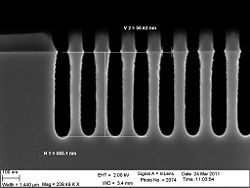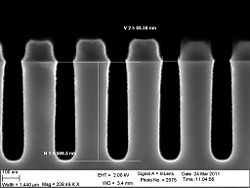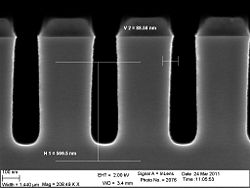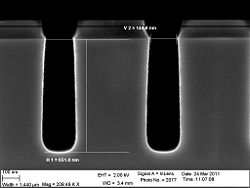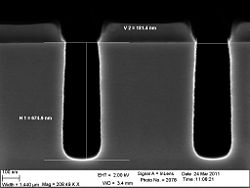Specific Process Knowledge/Etch/DRIE-Pegasus/nanoetch/nano12: Difference between revisions
Appearance
No edit summary |
|||
| (2 intermediate revisions by the same user not shown) | |||
| Line 1: | Line 1: | ||
'''Feedback to this page''': '''[mailto:labadviser@ | '''Feedback to this page''': '''[mailto:labadviser@nanolab.dtu.dk?Subject=Feed%20back%20from%20page%20http://labadviser.nanolab.dtu.dk/index.php/Specific_Process_Knowledge/Etch/DRIE-Pegasus/nanoetch/nano12 click here]''' | ||
<!--Checked for updates on | <!--Checked for updates on 30/7-2018 - ok/jmli --> | ||
<!--Checked for updates on 5/10-2020 - ok/jmli --> | |||
== The nano1.2 recipe == | == The nano1.2 recipe == | ||
{{Template:Author-jmli1}} | |||
<!--Checked for updates on 2/02-2023 - ok/jmli --> | |||
{| border="2" cellpadding="2" cellspacing="1" | {| border="2" cellpadding="2" cellspacing="1" | ||
Revision as of 15:17, 2 February 2023
Feedback to this page: click here
The nano1.2 recipe
Unless otherwise stated, all content on this page was created by Jonas Michael-Lindhard, DTU Nanolab
| Recipe | Gas | C4F8 38 sccm, SF6 52 sccm |
|---|---|---|
| Pressure | 4 mTorr, Strike 3 secs @ 15 mTorr | |
| Power | 800 W CP, 50 W PP | |
| Temperature | -10 degs | |
| Hardware | 100 mm Spacers | |
| Time | 120 secs | |
| Conditions | Run ID | 1817 |
| Conditioning | Sequence: Oxygen clean, MU tests, processes, no oxygen between runs | |
| Mask | 343 nm zep etched down to 154 nm |
- The results of the nano1.2 recipe
-
The 30 nm trenches
-
The 60 nm trenches
-
The 90 nm trenches
-
The 120 nm trenches
-
The 150 nm trenches
| Nominal trench line width | ' | 30 | 60 | 90 | 120 | 150 | Avg | Std |
| Etch rates | nm/min | 241 | 285 | 307 | 325 | 335 | 299 | 37 |
| Sidewall angle | degs | 92 | 92 | 92 | 91 | 91 | 92 | 0 |
| CD loss | nm/edge | -5 | -8 | -18 | -18 | -34 | -17 | 11 |
| CD loss foot | nm/edge | -5 | -8 | -18 | -18 | -4 | -10 | 7 |
| Bowing | 19 | 11 | 11 | 14 | 10 | 13 | 4 | |
| Curvature | -48 | -46 | -43 | -40 | -40 | -44 | 4 | |
| Zep etch rate | nm/min | 95 | ||||||
Comments
Lower temperature certainly looks like a step in the right direction. Confirms that the process was too etch aggressive previously, hence the isotropic profiles.

